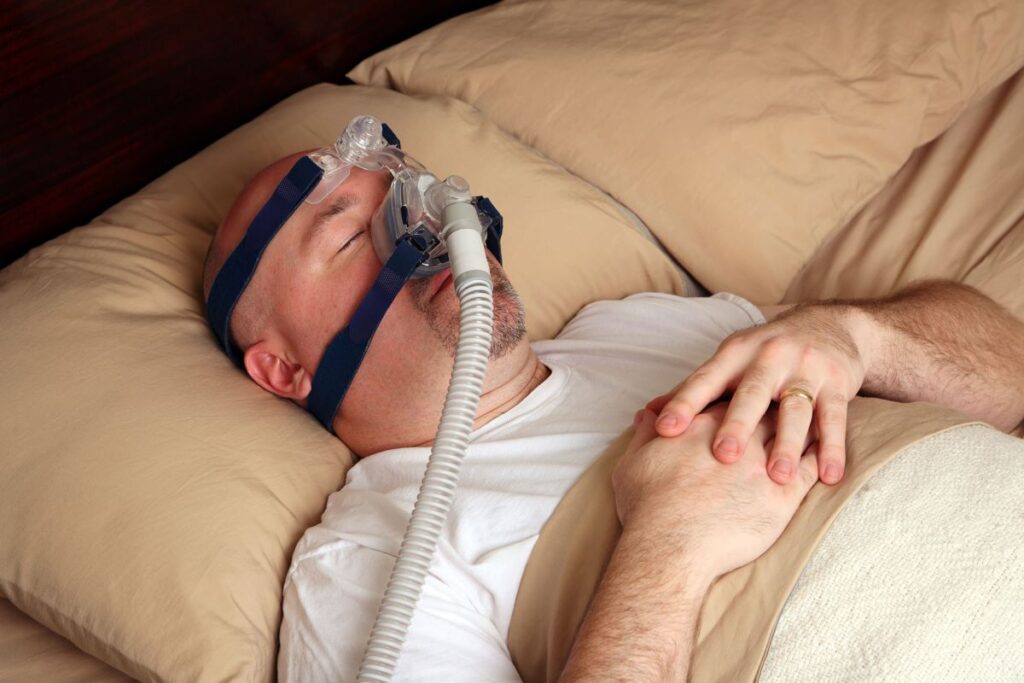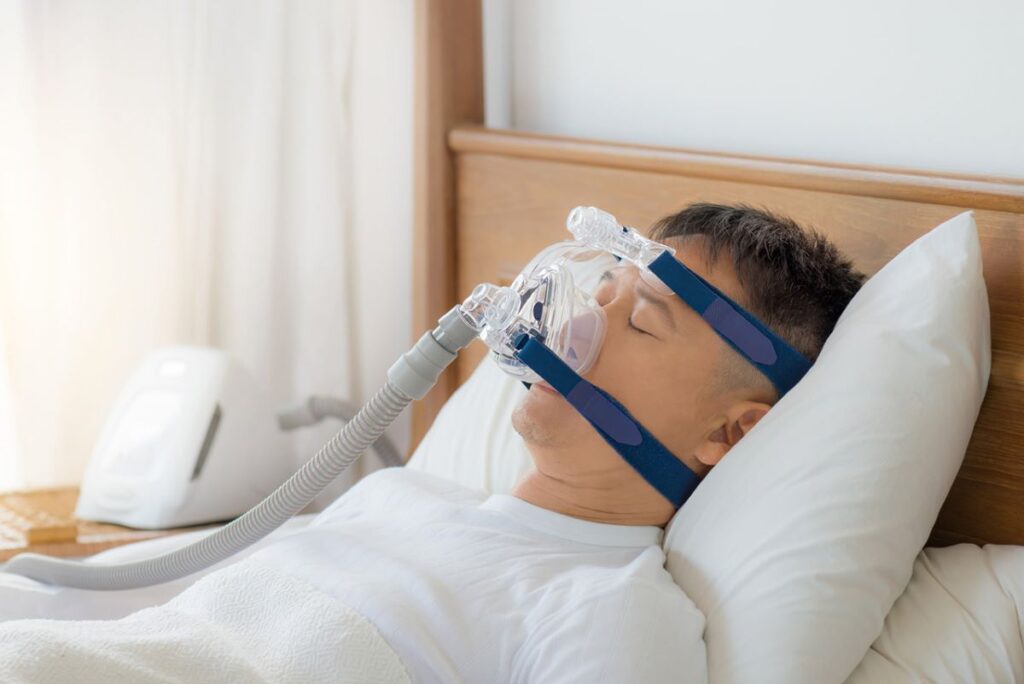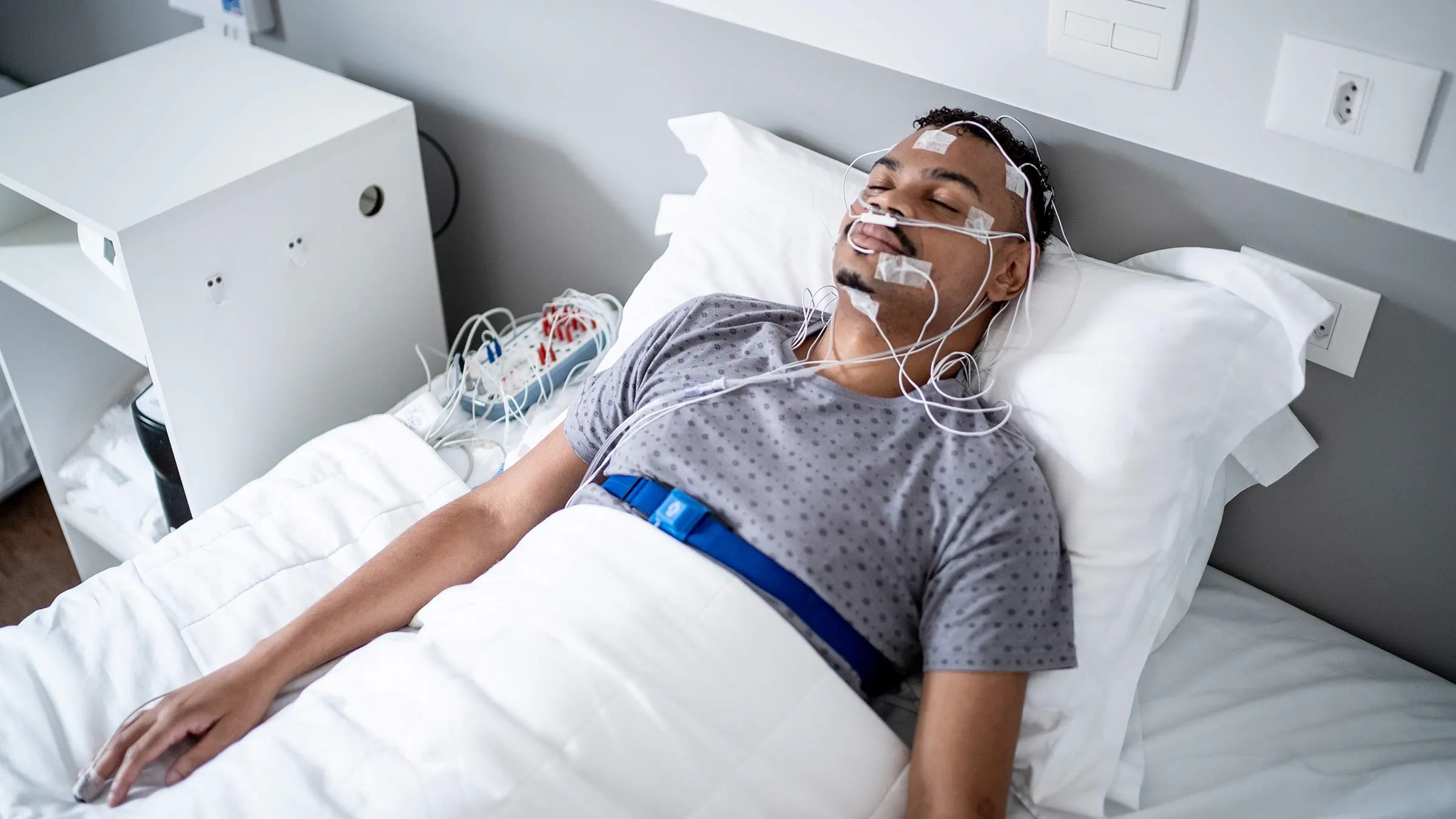What is Home Sleep Testing and How Does it Work?
Home sleep testing is an innovative way to diagnose sleep disorders, especially obstructive sleep apnea, without the need for overnight stays in hospitals or clinics. This method uses portable sleep monitoring technology, which enables you to have a thorough sleep assessment in your own bedroom.
The process involves using a small device that you wear while sleeping. This device records various bodily functions throughout the night. Before taking the device home for your test, you will be given clear instructions on how to properly wear it.
Data Collection During Home Sleep Studies
The advanced equipment used in home sleep studies records important information about your sleep:
- Breathing patterns – identifying pauses, shallow breaths, and effortful breathing
- Heart rate variations – tracking changes in heart rate during sleep
- Oxygen saturation levels – measuring drops in blood oxygen levels that indicate apnea episodes
- Body movements – monitoring how much you move and what position you sleep in
Professional Analysis and Interpretation
Qualified Australian sleep doctors review your home sleep test Australia data using established guidelines. These experts analyze breathing events, oxygen level drops, and disruptions in sleep to determine whether sleep disorders are present and how severe they may be.
Unlike traditional polysomnography done in sleep labs, which also measures brain activity, home testing primarily focuses on breathing patterns. While lab tests provide more detailed insights into brain function, a home sleep test in Australia offers valuable, accurate, and convenient information for diagnosing obstructive sleep apnea.
Who is Eligible for Home Sleep Testing Under Medicare in Australia?
Medicare home sleep test eligibility requires specific criteria to qualify for rebates under the Medical Benefits Schedule (MBS). You must obtain a GP referral for sleep study that clearly indicates high risk for obstructive sleep apnoea (OSA). Your general practitioner will assess your symptoms and medical history before determining if you meet the necessary threshold for Medicare coverage.
The referral process typically involves completing validated screening questionnaires that help identify your risk level. The Epworth Sleepiness Scale measures your likelihood of falling asleep during daily activities, scoring your responses from 0-24. Scores above 10 generally indicate excessive daytime sleepiness warranting further investigation. Healthcare providers also utilise the STOPBANG questionnaire, which evaluates eight key risk factors:
- Snoring loudly
- Tiredness during the day
- Observed breathing interruptions
- Pressure (high blood pressure)
- Body Mass Index over 35
- Age over 50
- Neck circumference greater than 40cm
- Gender (male)
Patient selection criteria determine whether you’re suitable for home testing versus comprehensive laboratory polysomnography. You’ll typically qualify for home sleep testing if you present with uncomplicated suspected OSA without significant comorbidities. Patients with complex cardiovascular conditions, severe chronic obstructive pulmonary disease, or neuromuscular disorders usually require more detailed clinic-based studies to ensure accurate diagnosis and appropriate treatment planning.
What Are the Advantages of Home Sleep Testing Compared to Clinic-Based Studies?
The benefits of home sleep testing extend far beyond simple logistics, fundamentally transforming how Australians approach sleep disorder diagnosis. Your own bedroom becomes the diagnostic environment, eliminating the artificial setting of clinical sleep laboratories that can affect natural sleep patterns.
1. Enhanced Patient Comfort
Patient comfort reaches its peak when you sleep in familiar surroundings. Your usual pillow, mattress firmness, room temperature, and bedtime routine remain unchanged, providing more accurate representation of typical sleep behaviour. This natural environment often reveals sleep patterns that might be masked in the unfamiliar clinical setting.
2. Greater Convenience
The convenience factor eliminates multiple barriers to diagnosis. You avoid:
- Overnight hospital stays requiring time off work
- Travel expenses to specialised sleep centres
- Childcare arrangements for overnight absences
- Parking fees and urban traffic challenges
Home testing accommodates your schedule rather than clinic availability. You can conduct studies over multiple nights, capturing variations in sleep patterns that single-night laboratory studies might miss. This multi-night approach provides sleep physicians with comprehensive data for more accurate diagnosis.
3. Improved Accessibility for Regional and Remote Australians
Regional and remote Australians benefit significantly from improved accessibility. Distance no longer prevents timely diagnosis, particularly crucial given Australia’s vast geography and concentrated urban medical facilities.
4. Increased Efficiency in Healthcare System
Healthcare system efficiency improves as home testing reduces demand on limited sleep laboratory resources. This streamlined approach allows more patients to receive diagnostic services while maintaining clinical accuracy standards required by Australian sleep physicians.
How is Obstructive Sleep Apnea Diagnosed and Treated Through Home Sleep Testing?
OSA diagnosis Australia relies on specific metrics captured during home sleep studies. The diagnostic process measures critical parameters including the arousal index, which tracks sleep disruptions per hour, and oxygen desaturation events that indicate breathing interruptions. These measurements help determine the severity of sleep apnea using the Apnoea-Hypopnoea Index (AHI), where values above 15 events per hour typically indicate moderate to severe OSA requiring treatment.
Qualified Australian sleep physicians play a crucial role in interpreting your test results and developing personalised treatment recommendations. These specialists analyse the comprehensive data collected during your home study, considering factors such as:
- Sleep efficiency and architecture patterns
- Respiratory disturbance frequency and duration
- Blood oxygen saturation levels throughout the night
- Heart rate variability during sleep events
Treatment options for OSA extend beyond the traditional CPAP therapy approach. Your treatment pathway may include lifestyle modifications such as weight management, sleep position training, and alcohol reduction. CPAP therapy initiation involves carefully calibrated pressure settings determined through titration programs that can often be conducted at home using auto-adjusting devices.
The collaborative care model ensures comprehensive treatment success. Your sleep physician coordinates with dentists for oral appliance therapy, surgeons for anatomical corrections when necessary, pharmacists for medication management, and GPs for ongoing health monitoring. This multidisciplinary approach addresses the complex nature of sleep apnea while maintaining the convenience that makes Home Sleep Testing in Australia: A Convenient Alternative to Clinics increasingly popular among patients seeking effective OSA management. You may like to visit https://keyfutura.net/sleep-apnea-test-canberra-early-diagnosis-and-treatment-options/ to get more about Sleep Apnea Test Canberra: Early Diagnosis and Treatment Options.
What Role Does Air Liquide Healthcare Play in Facilitating Home Sleep Testing in Australia?
Air Liquide Healthcare sleep solutions is Australia’s largest provider of home sleep apnoea studies and therapy, changing the way patients receive care for sleep disorders across the country. This healthcare leader has transformed the traditional method of sleep medicine by developing comprehensive pathways that remove many obstacles patients used to face.
The company’s integrated OSA management Australia model offers a complete solution that covers every step of the patient journey. From initial home-based sleep studies to ongoing therapy management, Air Liquide Healthcare oversees the entire process in one place. Their non-invasive recording technology gathers important sleep information in patients’ homes, while qualified sleep doctors confirm diagnoses and treatment suggestions.
Strategic Partnerships with Leading CPAP Manufacturers
Air Liquide Healthcare has formed strategic partnerships with leading CPAP equipment manufacturers as part of their extensive network. This ensures that patients have access to the most advanced therapeutic technologies available.
Some of the key CPAP manufacturers they collaborate with include:
- ResMed
- Philips Respironics
- Fisher & Paykel Healthcare
By working closely with these industry leaders, Air Liquide Healthcare can offer patients the latest innovations in sleep apnea treatment, such as advanced CPAP devices and integrated humidification systems.

Multi-Brand Strategy for Diverse Patient Populations
In addition to their partnerships with CPAP manufacturers, Air Liquide Healthcare also operates through multiple established sleep brands. This multi-brand approach allows them to better serve diverse patient populations across both urban and regional areas.
Some of the established sleep brands under Air Liquide Healthcare include:
- SNORE Australia
- Healthy Sleep Solutions
- Mycroft
- Complete Care
- Sleep Disorder Australia (SDCA)
Each brand within this portfolio has its own unique strengths and expertise, enabling Air Liquide Healthcare to tailor their services to meet the specific needs of different patient groups.
Structured Support Programs for CPAP Therapy Initiation
To ensure successful initiation of CPAP therapy, Air Liquide Healthcare has implemented structured support programs for patients starting treatment. These programs provide guidance on proper device usage, troubleshooting common issues, and establishing healthy sleep habits.
By offering personalised support during this critical phase, Air Liquide Healthcare aims to improve patient adherence to CPAP therapy and maximise treatment outcomes.
Continuity of Care through Regular Check-Ups
Maintaining continuity of care is essential for long-term success in managing sleep disorders. Air Liquide Healthcare understands this importance and conducts regular check-ups with patients as part of their ongoing therapy guidance.
During these check-ups, healthcare professionals assess the effectiveness of CPAP therapy, address any concerns or challenges faced by patients, and make necessary adjustments to treatment plans if required.
This proactive approach ensures that patients remain engaged throughout their treatment journey and receive optimal care at every stage.
Are There Limitations or Cases Where Home Sleep Testing May Not Be Suitable?
While home sleep testing offers significant advantages, limitations of home sleep testing become apparent when dealing with certain medical conditions that require more comprehensive monitoring. Sleep physicians carefully evaluate each patient to determine the most appropriate diagnostic approach.
Complex sleep disorders diagnosis, such as REM sleep behaviour disorder, necessitates the detailed monitoring capabilities only available through laboratory-based polysomnography. Patients with the following conditions typically require in-clinic studies:
- Severe COPD – requires continuous monitoring of respiratory mechanics and gas exchange patterns
- Neuromuscular diseases – need assessment of respiratory muscle function and central nervous system involvement
- Morbid obesity with resting hypoxia – demands comprehensive cardiopulmonary monitoring during sleep
- Complex cardiovascular issues – require detailed cardiac rhythm analysis and blood pressure monitoring
The simplified monitoring approach of home sleep testing may miss subtle but clinically significant findings in these populations. Sleep physicians must also consider patients with suspected central sleep apnoea, periodic limb movement disorder, or those needing comprehensive brain wave monitoring available only in sleep laboratories.
Appropriate patient selection remains crucial for diagnostic accuracy. Australian sleep physicians use established clinical guidelines to identify candidates who will benefit most from home testing whilst ensuring those with complex presentations receive the comprehensive evaluation they require. This careful screening process maintains the reliability and clinical validity of home sleep testing results. You may like to visit https://pmc.ncbi.nlm.nih.gov/articles/PMC6699256/ to get about Can We Use Home Sleep Testing for the Evaluation of Sleep Apnea in Obese Pregnant Women?
How Does Home Sleep Testing Improve Access to Care Across Australia?
Home Sleep Testing in Australia: A Convenient Alternative to Clinics
Home Sleep Testing in Australia is transforming healthcare delivery by eliminating geographical barriers that traditionally prevent Australians from receiving timely sleep disorder diagnoses. You no longer need to travel hundreds of kilometres to reach specialised sleep clinics, particularly beneficial for patients in regional and remote areas where hospital availability remains limited.
The convenience of conducting studies in your own home accelerates the diagnostic timeline significantly. Traditional clinic-based sleep studies often involve waiting lists spanning several months, whilst home sleep testing can typically be arranged within weeks. This increased early diagnosis enables healthcare providers to implement treatment strategies before sleep apnoea complications develop, reducing long-term health risks and associated healthcare costs.
How Home Sleep Testing Expands Access to Care
- Increased Early Diagnosis: Home Sleep Testing allows for quicker diagnoses, enabling healthcare providers to start treatment before complications arise.
- Affordable Treatment Options: Private health insurers now cover CPAP therapy under specific packages, making treatment more affordable for diagnosed patients.
- Cost-Effective Solutions: Medicare rebates for qualifying home sleep studies reduce out-of-pocket expenses, ensuring cost doesn’t become a barrier to diagnosis.
- Consistent Service Delivery: Air Liquide Healthcare’s extensive network ensures consistent service delivery across metropolitan and regional locations.
Equity in Healthcare Access
Home Sleep Testing programs particularly benefit regional healthcare accessibility. With brands like SNORE Australia and Healthy Sleep Solutions under Air Liquide Healthcare’s umbrella, you can access the same quality diagnostic services whether you live in Sydney’s CBD or rural Queensland. This creates equity in healthcare access that traditional clinic-based models struggled to achieve.
Is Home Sleep Testing the Future of Patient-Centred Diagnostics in Australia?
Home sleep testing Australia represents a significant shift towards patient-centred healthcare delivery. This innovative approach transforms how Australians access sleep disorder diagnostics by placing convenience and comfort at the forefront of medical care.
The future of home sleep testing Australia lies in its ability to deliver clinical-grade results whilst eliminating traditional barriers. You can now receive accurate sleep apnea diagnosis without compromising your natural sleep environment or daily routine. This technology demonstrates comparable diagnostic accuracy to laboratory-based polysomnography for detecting obstructive sleep apnea in appropriate candidates.
Why Home Sleep Testing is Beneficial
Patient experience improvements extend beyond convenience:
- Reduced anxiety from sleeping in familiar surroundings
- Elimination of travel costs and time away from work
- Multiple night testing capability for enhanced diagnostic reliability
- Faster treatment initiation through streamlined pathways

Who Benefits Most from Home Sleep Testing?
Healthcare accessibility reaches new heights through home-based diagnostics. Regional Australians particularly benefit from this technology, accessing specialist sleep medicine services previously limited to metropolitan areas. The integration of Medicare coverage and private health insurance support creates affordable pathways for comprehensive sleep disorder management.
If you’re experiencing symptoms of obstructive sleep apnea, Home Sleep Testing in Australia: A Convenient Alternative to Clinics offers you a practical solution. Speak with your GP about eligibility for home sleep testing and take the first step towards better sleep health through this patient-centred diagnostic approach.

